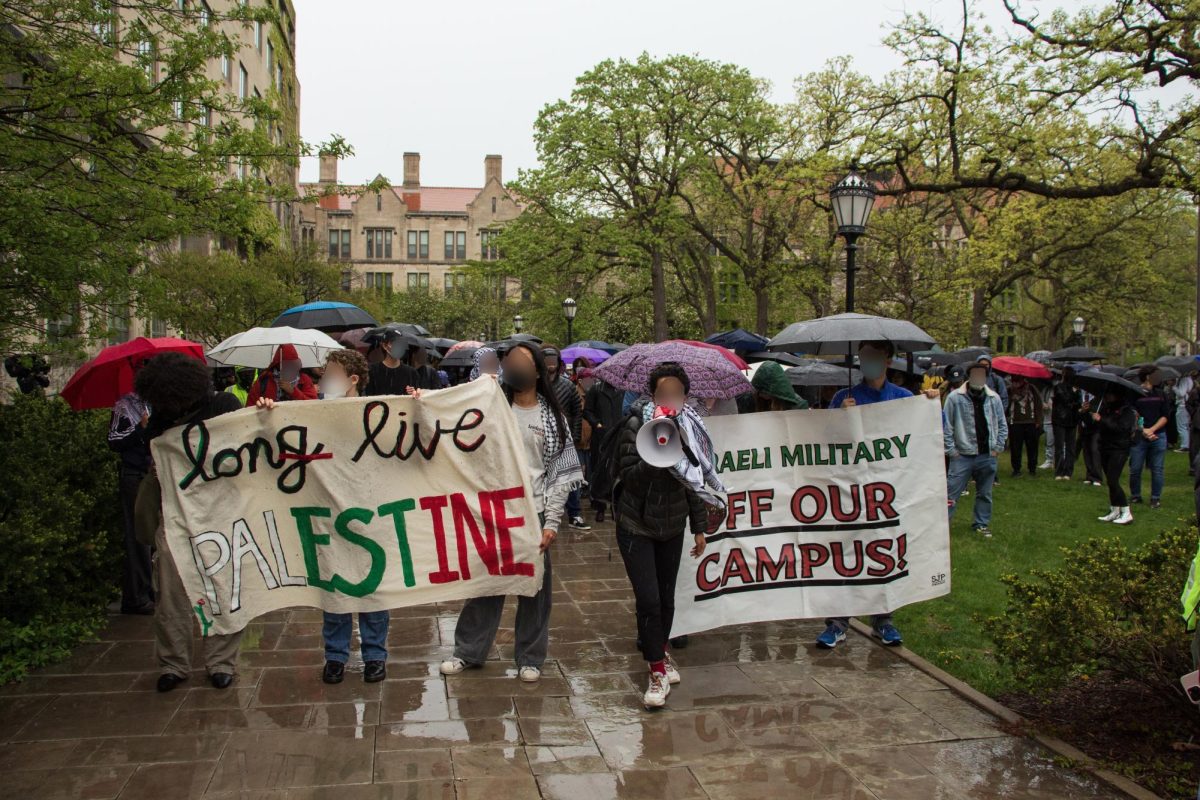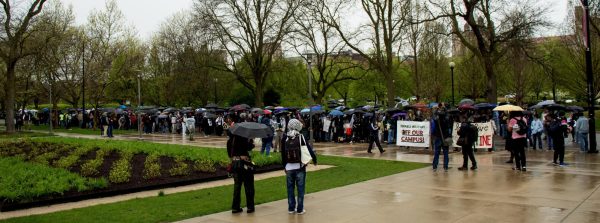
Nathaniel Rodwell-Simon
UCUP protestors in April 2024.
UChicago United for Palestine (UCUP) held a rally in front of Levi Hall on Friday before leading a march throughout campus. The crowd of more than two hundred demonstrators called on the University to divest from weapons manufacturers and fossil fuel companies, publicly disclose its investments, and initiate a process of reparations for Palestine and residents of the South Side.
The protest comes as a growing number of students at universities across the country have set up tents on campus spaces to protest the war in Gaza and call for their respective universities to divest from Israeli military-related companies. UCUP did not announce plans to install an encampment of their own. Student marshals wearing green safety vests, designated by the protest’s organizers, were present throughout the march to maintain order and redirect traffic away from the demonstrators.
“As a coalition of organizing groups, we have asked several times over the years for the University to disclose and divest from these unethical investments. We are a university that still continues to invest in fossil fuels at the cost of perpetuating climate change. We are a university that continues to militarize this campus with more police rather than listening to its community,” said Sarah, an organizer with UCUP, speaking to the crowd outside of Levi Hall. “It is our duty, our moral imperative, our responsibility to stand up for the Palestinian people. It is our duty to show up, it is our duty to be here right now.”
Many students expressed uncertainty about whether the rally and protest movements on campus would spur the University to take action, but said they felt that participating in the protest was a means of expressing their dissent against UChicago’s role in the war in Gaza.
“I’m just doing my part as a student. I know that the University is complicit in the genocide that is currently taking place in Gaza, and as a UChicago student, I am mainly concerned with how UChicago is implicated in all of this,” one of the protestors, a fourth-year political science major, told the Maroon during the march. “There has never been such a large movement for Palestinian liberation in the U.S., and I’m gonna try to be part of it—whatever I can contribute.”
The Maroon also spoke to another protestor, a graduate student at the University.
“[I] just watch everything on social media and feel so fucking shitty. So [to protest] feels like the only option,” they said.
Following the initial rally, organizers led the group south across the Midway, stopping at the Crown Family School of Social Work, the Law School, the Rubenstein Forum, and the Harris School of Public Policy. Organizers with the groups that make up UCUP—including Students for Justice in Palestine (SJP), Environmental Justice Task Force (EJTF), #CareNotCops, and U of C Against Displacement (UCAD)—spoke at each of the buildings, discussing the University’s connections to Israel, fossil fuels, weapons manufacturing, displacement in the South Side, and policing.
Although the University does not disclose its investments, a 2020 Maroon report found that the University’s investments were partially tied to fossil fuels and weapons manufacturers. A 2023 Amnesty International report scored the University 0/40 on its investment practices and their alignment with the United Nations Guiding Principles of Human Rights.
The University has long maintained that its investments are politically neutral. In a statement to the Maroon, the University reiterated its position against divestment.
“As part of our commitment to free expression, the University is deeply committed to upholding the rights of protesters and speakers to express a wide range of views,” the statement said. “Over more than a century, through a great deal of vigorous debate, the University has developed a consensus against taking social or political stances on issues outside its core mission. The University’s longstanding position is that doing this through investments or other means would only diminish the University’s distinctive contribution — providing a home for faculty and students to espouse and challenge the widest range of social practices and beliefs.”
A speaker from #CareNotCops addressed the protest while it was stopped in front of the Crown School.
“UChicago invests in death, here in Chicago in the South Side, and in Palestine. They put their money towards surveillance over community programs, for funding companies like Boeing that makes the bombs that Israel uses to destroy homes, universities, and hospitals in Gaza,” the speaker said.
They drew parallels between the pro-Palestine movement and the movements against racial discrimination.
“Our struggle and our resistance are interconnected. Palestinian folks were on the ground of Black Lives Matter in 2015 in Ferguson and 2020 during the George Floyd riots,” they said. “So we as abolitionists need to keep showing up in solitary for Palestine, now and always.”

Outside the Rubenstein forum, a speaker from EJTF spoke to the crowd about the building’s namesake David Rubenstein’s investments in fossil fuels. Rubenstein is the current chair of UChicago’s Board of Trustees, a position he has held since March of 2022. As the speaker noted, Rubenstein is also co-founder and co-chairman of The Carlyle Group, a private equity firm that has been criticized for the carbon footprint of the fossil fuel companies in its investment portfolio.
“The fossil fuel industry and the military industrial complex are fundamentally intertwined. The purpose of the military and of militarism is to preserve the extractive economy and political system, in which the U.S. and its Western imperialist allies can have complete access to the natural resources and labor of the Global South,” the speaker said. “The extractive economy enables militarism, and militarism is what enforces the extractive economy. The University of Chicago must divest from both.”
The march’s final stop was in front of the Harris School of Public Policy, where a speaker named Hassan with SJP criticized UChicago’s academic ties to Israeli officials and institutions.
“For years, the University of Chicago, through the Israel Institute and the so-called Chicago Project on Security and Threats, has hosted Israeli general Meir Elran to hold and teach classes on so-called counterterrorism,” Hassan said. “The danger is, these so-called security study programs aren’t just stupid. They’re meant to prepare you for a career of crushing popular resistance.”
“We call on all of you to join in our campaigns until there’s no Israel Institute left on our campus, until reparations to the South Side are paid, until UCPD is disbanded and endowment investment in fossil fuels ends,” Hassan said.
Editor’s note, April 27, 2024, 12:08 a.m.: This article has been updated to include a statement from the University.